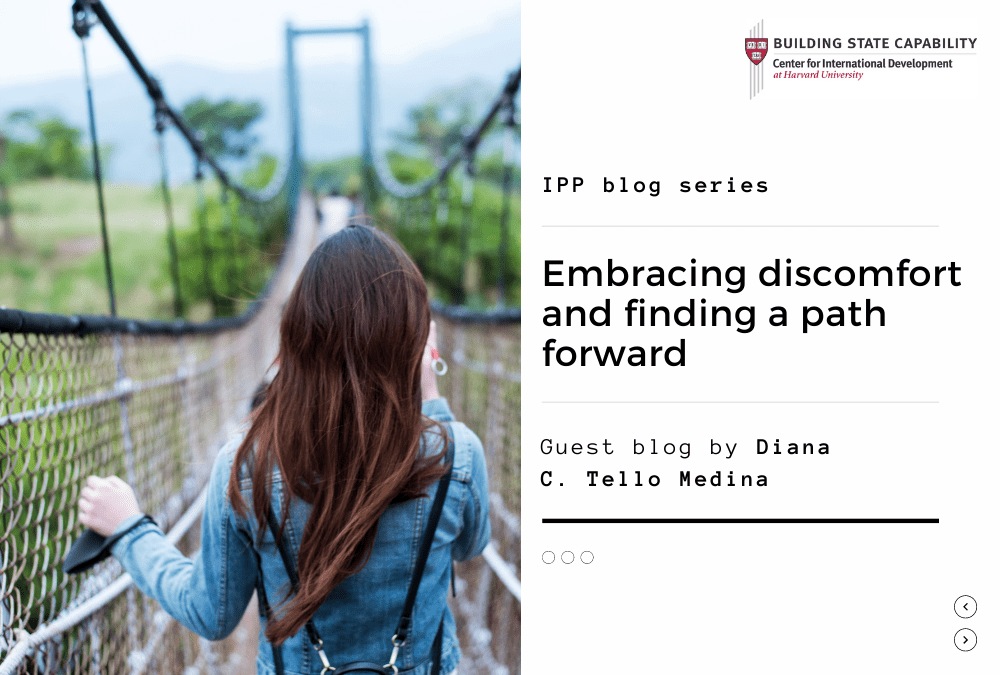Guest blog by Diana C. Tello Medina
I must confess that I knew a little bit about what to expect when I joined the IPP course. I had the opportunity to take another Harvard course, co-chaired by Matt, and he teased me. The more I learned about this new methodology, the more I wanted to know how it worked, how it has worked in different contexts, what the secrets were, and how could I implement it.
I honestly didn’t know what I was about to go through. I love wake-up calls, I love getting out of my comfort zone. I always say that I feel uncomfortable when it starts feeling comfortable. And this course was exactly that: a methodology on how to never get comfortable. A methodology on how to dig deeper into the root causes of problems, knowing that those answers could take you into many directions. Into directions where you, your authorizers, your colleagues, the people you care about, may not want to go. Into directions where you WILL have to disappoint someone. Always. But you know it’s your duty, because you care, because that’s what you signed up for when you decided to care, because turning around is comfortable, and you don’t like that.
And this course is not ‘only’ about PDIA. It is also about who you need to be to go through that kind of journey. Practical tips on how to improve on leadership skills, on communicating with different groups, on teaming, on taking care of yourself, to keep working on being your best version for this journey. It is not easy, but it is worth it.
In my case, my implementation challenge was linked to unsustainable public services in a territory where cities are not being equipped with the needed infrastructure and public services for citizens to have a good quality of life, economic opportunities, and a sustainable environment. But why?
One of the key insights I got during these months, is that there is a huge disconnect between national and local entities. National goals have been achieved, with ‘good’ numbers in the last decades. But when looking deeper into local firms and citizens, numbers were less good. Talking to different players was key to understanding why cities are not equipped to serve their citizens – in some cases due to strong private sector power, in some other cases due to poor resources/capacities, in many cases because it was not the responsibility of the city, and in every case, because local plans were done at the central level, with no follow-up on implementation. With no follow-up on needed capacities, financial resources, or political economy preventing those nice, well-done, national plans, to have an impact on the ground.
I believe that putting more voices on the table is key to untapping the real problems. Those that no one wants to solve. I have to say it wasn’t easy under COVID-19 context. I think I’m good when talking to people, getting their trust, being empathic. I love to listen and learn. I am always less confident about solutions. However, having all these conversations through Webex, with several people connected at the same time (because it is easy to just join a meeting, but it may actually create a not very safe environment for people to express their opinions), made it more difficult to create those connections. And things progressed more slowly than desired, and burnouts were on the way. And I kept disappointing people, many times myself. But I came back. Because this is about how we react to those challenging circumstances. How we bounce back. And that ‘iterative’ process, those check-ins with my amazing Governance A team, were what I needed to be patient, to be kind with myself, to keep going. Having a supportive group of people surrounding you is crucial for these types of journeys. For those moments where you forget why you are doing this.
Keeping track of the little achievements (or not so little) is one of the things that I’m working on implementing. I think this is particularly important when things ‘move slow’, or priorities of authorizers are just somewhere else, or when you are just simply juggling so many things at the same time. Understanding that sometimes small achievements are good enough, and that you need to communicate them, is one of my weaknesses. I tend to weight myself in huge scales. But this doesn’t help anyone. Certainly not my motivation.
I am still new in this sector. I worked for 8 years in the private sector before joining the development world. I decided I wanted to have a real impact, to do something that mattered. I had no idea what that was (it’s getting clearer and clearer). I’ve been trying to understand this new world for the last 4 years. It is a tough world. With many, many people that care, but also many people that don’t. And as this course taught me, you need to work with all of them to have an impact.
I am still far from being where I would like to be – having a real impact and disappointing even more people, but I feel I am in the right direction. And now I know that I’m not the only one in this journey.
This is a blog series written by the alumni of the Implementing Public Policy Executive Education Program at the Harvard Kennedy School. Participants successfully completed this 6-month online learning course in December 2020. These are their learning journey stories.
